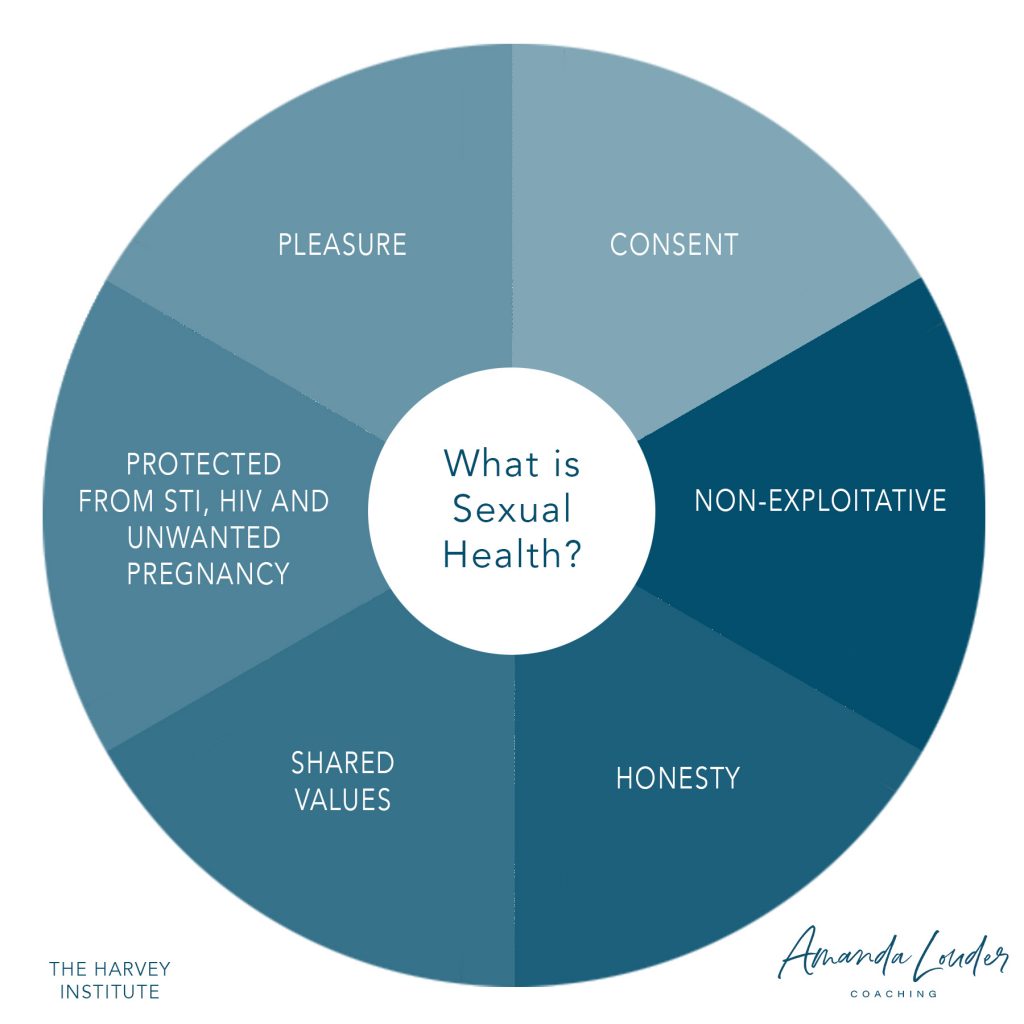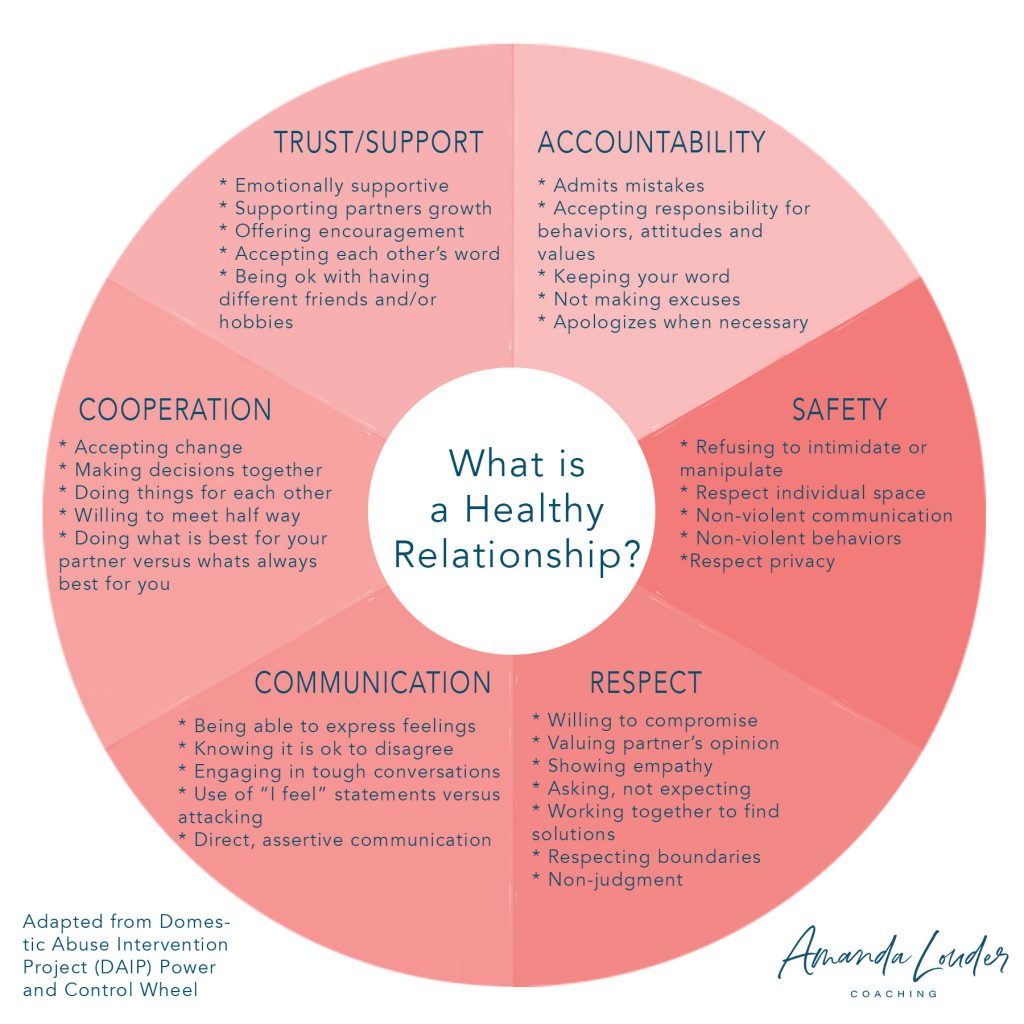
Do you have a healthy marriage and sexual relationship? How do you know if you do or not? In this week’s episode, I am sharing the 6 Principles of Healthy Sexuality and what a healthy relationship looks like. This is a great way to see what areas you and your spouse can improve upon and strengthen.
Download your FREE Worksheet!





Show Notes:
Follow Amanda on Facebook and Instagram.
Join Amanda’s Private Facebook Group.
References for this episode:
Show Summary:
Most people don’t come to me to help them improve their sexual health. They come to me when something isn’t working. They are concerned about theirs or their spouses sexual behavior, sexual satisfaction or lack of sexual pleasure. They want to address conflicts about frequency, desire discrepancies, and sometimes the fallout after infidelity. They come to me when something isn’t working. Changing unwanted behaviors and patterns may be the most prevalent reasons for seeking help, but it makes up just a small component of a much larger concept of sexual health.
I also get a lot of questions from people of “is this normal?” “Are we normal?” “Is he/she normal?” And normal is pretty relative. Normal is very broad. What feels normal to one, may not be normal to others. So defining healthy sexuality can help us understand if we have a “normal” sexual relationship and what a healthy sexual relationship looks like.
So today, I want to address the 6 Principles of Sexual Health.
History
Up until the middle of the last century, sexual health meant two things.
- Avoiding an unwanted or unplanned pregnancy
- Not acquiring a sexually transmitted disease.
The World Health Organization and other health organizations began to develop sexual health definitions beyond those 2 things. Now, sexual health encompasses a society in which each person is guided in having a safe and pleasurable sex life beyond the mere absence of the unwanted consequences of sexual activity.
The World Health Organization definition of sexual health encompasses human rights related to sexual health, sexual pleasure, eroticism, gender and sexual relationship diversity, sexual satisfactions, diseases, violence, female genital mutilation, sexual dysfunction, and mental health related to sexual health. So, it really encompasses a lot.
Sexual health can be understood as a set of principles that integrate personal values, ethics, religious beliefs, cultural norms, and unconventional sexual interests or practices. The 6 Principles construct a broad set of minimum ground rules upon which each person can come to know their own specific individual vision of personal sexual health. They can use these principles to create a map to provide conversations about sexual activity, sexual functioning, and sexual relationships before it’s a problem or hurts someone.
Think about these six principals of sexual health as guidelines or goals for living your sexual life in a way that you feel proud and can create sexual self-esteem for yourself and those you love.
Consent
The first principal is consent. I feel like consent is a big buzz word right now. We typically think of consent with dating or with some sort of abuse – when someone isn’t legally able to give consent. Consent isn’t really something we talk a lot about with marriage. A lot of people feel like consent is just kind of a given in marriage. But that is actually far from the case.
Sexual consent means that someone voluntarily cooperates with the goal that both partners are willing and want to try and reach sexual satisfaction. A healthy sexual relationship requires sex to be consensual.
According to The Harvey Institute “Consent transforms the act of sex from an invasion, intrusion or violation into an act of transformation. Establishing consent throughout each step of a sexual interaction provides each sexual partner space for sexual safety and pleasure that is consistent with their sexual desires. When consent is given, one is saying, “I want this experience to have an effect on me, to change me, to give me something that I desire, and I want you to provide it for me.”
This is one of the biggest issues I see with clients. Many women have “duty sex” or have sex out of obligation. And they do this for a variety of reasons.
- They feel pressured into it. Their spouse constantly asks, begs, or tries to make them feel guilty for saying no. They are cajoled and pushed to the breaking point by their spouse.
- They feel like if they don’t do it, there will be repercussions – like their spouse pouting, sulking, irritability or even anger directed toward them. And this behavior could go on for days.
- They feel that they are actually in danger if they don’t comply.
- They are scared that their spouse will not love them anymore, they will leave them, they will go have sex with someone else.
- They are afraid that if they don’t have sex with their spouse, their spouse will do something that will be detrimental to their eternal salvation, like watch pornography or masturbate.
- They feel like it is their duty as a wife to satisfy their husband sexually even if they don’t want to.
When we have sex for these reasons, it is not consensual because the wife is not participating with the intent of mutual satisfaction.
Consent is also not just a one time “yes, I will have sex with you tonight.” Consent means constant communication, which for many of us is hard because it wasn’t modeled for us. We probably didn’t see many conversations from our parents around this. And we definitely didn’t see conversations happening like this on TV or in the movies.
One partner saying “does that feel right” and another partner saying “I think I need more pressure” or “no, but I like it when you touch me here.” That is consent.
Consent is also checking in with your partner and respectfully accepting “no” as an answer. When someone honestly says “I’m not in the mood,” it certainly doesn’t mean they don’t love you. It just means they feel safe enough to be honest with you.
“The bottom line is this: you never outgrow the need to check in with your partner for consent in a relationship. Always asking your partner for consent is a way to show your respect for them and your desire for sex to be mutually enjoyable. In fact, communicating to ensure consent is shared and enthusiastic can bring you and your partner even closer together and open up new lines of communication surrounding pleasure and intimacy!” – Medium.com
Non-Exploitative
The second principal of sexual health requires sex to be non-exploitative. Exploitation is when a person uses their power and control to receive sexual gratification. We often think of this in terms of pornography of sex trafficking, but it also happens inside of marriages.
Exploitative sex unfairly makes use of someone for sex. It is ruthless and insensitive to the feelings of the partner. It is using coercion to gain access to sex.
Where I see this the most with my clients is when one partner unilaterally changes the couple’s sexual agreement by cheating. The exploitation is the cover-up, the denial, the pretending it didn’t happen and exploiting their partner’s trust. This can be a physical affair or an emotional one. But when they deny it all, to try and keep their partners trust so that they can continue to get sex, it’s exploitation, and it’s not ok.
Honesty
The third principal of sexual health is honesty. Honesty with yourself and your partner.
Honesty with yourself means being open to sexual pleasure, sexual experience, and sexual education. You were created to be a sexual being by your Heavenly Parents. When you deny this part of yourself, you are not being honest in who you are and were created to be.
Honesty with your partner is sharing with them how you truly feel, what you want, and what your experience was. One of the ways I see women being the most dishonest with their partner is by faking orgasm.
Without honesty, sexual relationships will not be able to have effective communication.
Shared Values
The fourth principal of sexual health is shared values.
What are your values around sex? What role does it play in your life? What do you believe about it?
I have a lot of clients who believe intellectually that sex is a good thing, but deep down they are holding on to misguided teachings they learned as youth. So really, they don’t believe that sex is a good thing. They believe it’s dirty and wrong and makes them unworthy in the eyes of God. If they aren’t honest with themselves and their partner about how they value sex, how can they ever have a healthy sexual relationship? They can’t.
So, this is a lot of the work that I do with my clients. Helping them understand what their values actually are around sex. What do they believe and how do they feel? What do they want to believe instead?
When they can come to their partner with a shared value that sex is good and right and can bring them closer together as husband and wife, it can lead to closeness and connectedness. Without it, it usually leads to avoidance and deception.
Protected from STI, HIV, and Unwanted Pregnancy
The fifth sexual health principal is protection from STI, HIV, and unwanted pregnancy. Many people don’t think that this one is pertinent to an LDS Marriage, but it is.
We can not feel safe and have healthy sexuality without proper protection from unwanted pregnancies and infections. These means honesty about sexual relationships before marriage and any other sexual encounters outside of our spouse once married. In also means not pressuring our spouse to have sex without contraception if pregnancy is not wanted.
I have a client, who had just had a baby a couple of months before. Her period just finished and so her husband pressured her to have sex without a condom because it feels so much better for him. Well…a couple of weeks later, she found out she was pregnant again. Of course she loves this baby and is happy to welcome him into her home, but I wouldn’t call this encounter sexually healthy, for a couple of reasons.
- She was pressured to do something she didn’t want to do
- She was not protected from an unwanted pregnancy
Pleasure
The sixth sexual health principle is pleasure. Pleasure is the primary motivation for any sexual activity, and I talk a lot about pleasure on this podcast. It’s also where I spend a lot of time with my clients. Helping them understand what pleasure feels like for them and learning how to open themselves up to it rather than shut it down. What gives us sexual pleasure is often a source of turmoil when our pleasure conflicts with aspects of our personal beliefs and values, and when they conflict with our partners beliefs and values. So we have to ask ourselves:
- How do I prioritize my pleasure while making sure my partner’s desires are also met?
- What if my partner isn’t ok with the ways I feel the most pleasure? How do I resolve this? (I see this a lot when one partner wants to try toys or vibrators, or even some light bondage and the other does not.)
- How do I learn how to develop my erotic mind and be ok fantasizing about things that I would never actually do, in order to get aroused?
I have a client that, when we were discussing her erotic map, said she loves the idea of being picked up by a stranger in a bar and being taken back to a hotel room for sex. That scenario, while wildly available in movies or TV, hasn’t ever happened to her in real life because she grew up a good Mormon girl. But, she felt ashamed about even fantasizing over that because it wasn’t “right” or “good.” So she would shut it down and turn it off. We discussed how important it is for her to have those fantasies and play them out in her mind. That it’s ok to think about it, or even roll-play it with her spouse, knowing that she would never do it. But fantasizing about it was ok.
Here’s another scenario. I have a client who’s husband loves to have her perform oral sex on him, yet she finds it disgusting and demeaning. But, she wants to learn how to please her husband without feeling like she is just an object that is there for his sexual gratification. She is learning how to balance what feels right and good for her with what is pleasurable for him for for mutual satisfaction.
I’ve spoken with so many women who tell me stories of their husbands getting theirs, but then rolling over and completely leaving her hanging. We talk about the importance of her being confident enough in herself and in her value in the relationship to make sure that her needs are also met.
Healthy Sexuality means mutual pleasure. It means being willing to be open and curious to how your partner experiences pleasures. That doesn’t mean that you have to do things you aren’t comfortable with, but trying to understand how you and your partner experience pleasure and making sex mutually satisfying is important.
What is a healthy relationship?
In addition to healthy sexuality, there are also 6 components to a healthy relationship. I’ll go through them briefly and I want you to ask yourself if you feel this way about your relationship.
- A healthy relationship has trust and support
- We are emotionally supportive
- We support our partners growth
- Partners offer encouragement to one another
- We are accepting of each other’s word
- We are ok with having different friends and/or hobbies
- A healthy relationship has accountability
- We admit our mistakes
- We accept responsibility for behavior, attitudes, and values
- We keep our word
- We don’t make excuses
- We apologize when necessary
- A healthy relationship has safety
- We don’t try to intimidate or manipulate each other
- We respect each others individual space
- We use non-violent communication
- We have non-violent behaviors
- We respect each other’s privacy
- A healthy relationship has respect
- We are willing to compromise with each other
- We value each other’s opinions
- We show empathy to one another
- We make requests of each other and drop expectations
- We work together to find solutions
- We respect each others boundaries
- We are non-judgmental of each other
- A healthy relationship has good communication
- We are able to express our feelings to one another
- We know that it is ok to disagree
- We are willing to engage in tough conversations
- We use “I feel” statements vs attacking statements
- We use direct, assertive communication
- A healthy relationship has cooperation
- We are accepting of change
- We make decisions together
- We do things for each other
- We are willing to meet half way
- We are willing to do what is best for our partner versus what is always best for ourselves
Summary
So, I hope this podcast provides a framework for you to think about and explore with your spouse about how you can have a healthy sexual relationship and a healthy relationship in general. I think most of us have probably experienced both healthy and unhealthy aspects of our relationship. This podcast is to just draw your awareness to what is healthy and what isn’t so that you can evaluate your experience and see where you can make some changes, not use it as a way to beat your self up or to make your spouse the bad guy. It’s information that you can use to make things better and healthy.
I’ve created a worksheet to help you go over each area of sexual health and a chart of what a healthy relationship is will also be included. I encourage you to fill it out and see where you can to make changes. You can download it below.
As always, if you need help in any of these areas, please book a mini-session with me on the homepage and we can get you into coaching.



